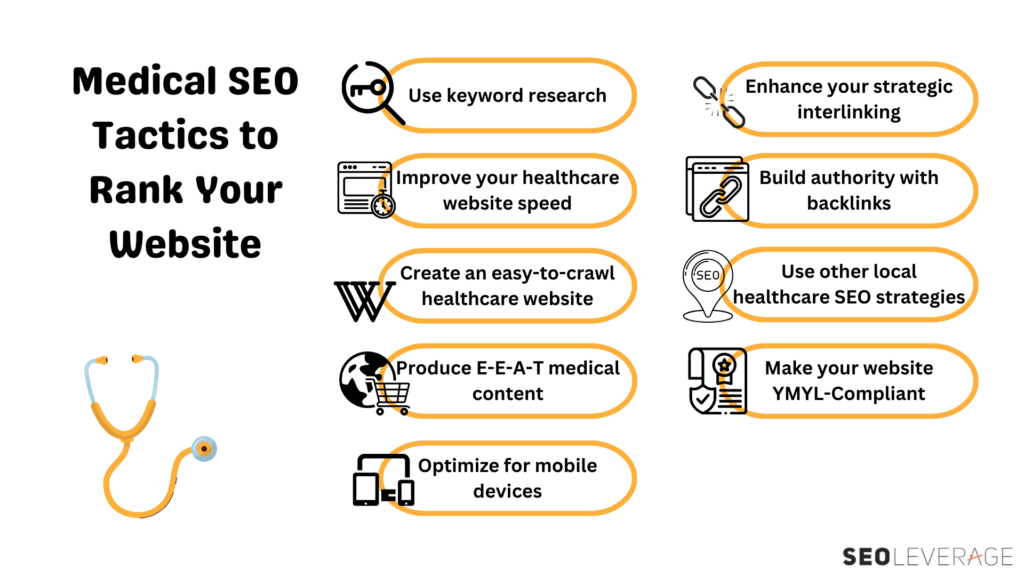As healthcare professionals seek to connect with patients, mastering healthcare SEO becomes important. According to a survey, 71% of patients use online reviews to find doctors.
With effective SEO strategies, you can enhance your medical brand's online visibility and attract more potential patients.
Here, we’ll go deeper into:
- What is SEO for healthcare means
- Why implement healthcare SEO
- How to achieve Medical SEO success
Table of Contents
What is Healthcare SEO?
Healthcare SEO, commonly referred to as medical SEO, signifies enhancing a healthcare provider's digital presence. This strategic approach helps to increase organic website traffic for your medical brand.
Setting yourself up online is simple. People easily search “doctor near me” on Google and other search engines. But because of the competition online, it’s hard to get noticed by them.
Algorithms are used by search engines to decide which websites appear higher in search results. These algorithms consider various factors, including keyword relevance, website speed, and backlink profile.
You can improve your website's ranking by implementing the right healthcare SEO strategies.
Benefits of Using SEO for Healthcare
Healthcare SEO is a strategy that boosts a medical brand's visibility online, particularly on Google SERPs. Here are the benefits of using search engine optimization.
Increased Website Traffic
According to these findings, 54% of smartphone users use their devices to look at business operating hours. On the one hand, an equally large portion (53%) seek directions to nearby retail locations.
SEO-optimized content that answers health queries is important for health services. This can build trust and authority, thereby driving more traffic to their websites.
Enhanced Medical Brand
According to recent data from January 2024, Google has a 91.5% market share in the global search engine landscape. This shows its considerable advantage over competing platforms like Bing and Yahoo.
When individuals conduct health-related searches, they are looking for reliable and knowledgeable providers. Therefore, if your medical practice ranks at the top of search results for keywords, it builds credibility.
Over time, this brand recognition translates into increased trust and leads to more appointments.
Attract Local Patients
A report from CNBC projects that 72.6% of search engine users will rely on their smartphones to open the web by 2025. In fact, online searches are the primary method for patients to book appointments with new healthcare providers. This trend highlights the importance of leveraging local SEO best practices in healthcare businesses.
Cost Efficiency
SEO is a long-term approach that can be highly cost-effective. But unlike traditional forms of advertising, SEO offers sustained results. This means that once your website achieves desirable rankings, it maintains those positions longer.
Medical SEO requires less frequent maintenance interventions. This lowers ongoing costs compared to constant ad placements.
Medical SEO Tactics to Rank Your Website
Here are the high-impact tactics that can help you generate more leads.
1) Use keyword research
Keywords play a role in healthcare SEO. Identify relevant keywords that your patients are likely to search when seeking healthcare services.
There are primarily two types of keywords used in medical SEO.
- Short-Tail Keywords. Comprising one to two words, these terms represent general inquiries with sizable monthly search volumes. But, this intensely fierce competition. Examples might include "doctor," "hospital," or "surgery."
- Long-Tail Keywords. Typically extending beyond three words, long-tail keywords characteristically have minimal competitors. Examples include "best pediatrician near me," "top rated urgent care center," or "affordable cosmetic surgery options."
Geo-targeted SEO draws upon location-based keywords to capture the attention of the local search. This local approach ensures that practices appear in searches that are most important to the community they serve. Keyword research tools are important to discover low-competition yet high-traffic keywords.
2) Improve your healthcare website speed
Website speed is another factor in SEO rankings.
A website that loads fast improves user experience. It also raises the likelihood that you will appear higher in search engine results pages. If your website takes a long time to load, potential patients may leave the page and seek services from your competitors.
Follow these steps to optimize your website's load time:
- Optimize Images. Large image files frequently bog down websites and cause delays in load times. Use compression tools to resize images according to the required dimensions.
- Minimize HTTP Requests. Streamline your codebase by minimizing CSS, HTML, and JavaScript elements to reduce HTTP requests.
- Enable Browser Caching. Store static assets on user computers so they don't need to download the same components. Prolong cache durations for repeat visitors and enjoy quicker response instances.
- Upgrade Hosting Plan. Look for premium hosting solutions offering dedicated servers, virtual private servers (VPS), or cloud-based infrastructure.
Use tools to find areas for improvement and implement what's needed to determine your website's speed.
3) Create an easy-to-crawl healthcare website
Crawlability refers to a website's ability to be found and indexed by search engine crawlers. To improve your website's crawl-ability, ensure you have:
- Logical website structure
- Interlink relevant internal web pages and blogs
- Eliminate broken links
4) Produce E-E-A-T medical content
High-quality content is the cornerstone of effective healthcare SEO.
When developing your content strategy, consider the E-E-A-T algorithm used by search engines like Google. Google's E-E-A-T stands for Experience, Expertise, Authoritativeness, and Trustworthiness. Introduced initially as part of the Search Quality Evaluator Guidelines, E-E-A-T has become a fundamental concept guiding Google's assessment.
Some factors to consider when creating content are:
- Fact-checking and ensuring accuracy
- Citing sources properly
- Making the content clear and concise
- Using visuals and other elements to make the content engaging
Creating well-researched, original, and informative content helps improve your website's ranking. It also positions you as an authoritative source in your field.
5) Optimize for mobile devices
Mobile optimization is important since mobile traffic accounts for over half of all. Make sure that your website runs quickly and offers a consistent user experience.
Besides offering an improved user experience, search engines also prefer optimized websites. It is important to ensure that your healthcare website is mobile-friendly. Google evaluates mobile versions of all healthcare websites.
6) Enhance your strategic interlinking
Strategic interlinking improves your website's structure, hierarchy, and user experience. You can link to high-quality pages that are relevant to your content, both internally and externally.
Here are some strategies to enhance your website with effective interlinking:
- Consider their demographics, health concerns, and information needs
- Organize content into clear categories
- Use natural linking
- Add relevant keywords without keyword stuffing
- Build trust via links to reputed medical sites
- Ensure easy navigation with links to FAQs and related topics
- Distribute link equity evenly across pages
- Cover key topics comprehensively with links to related subtopics
- Integrate relevant blog content within main website pages
In short, maintain link consistency. You need to ensure the link pages are current and relevant. In this way, it helps patients find the information they need to make healthcare decisions.
7) Build authority with backlinks
These are external links from other websites pointing to yours. These are important for building your healthcare website's authority.
Here are some effective ways to gain backlinks:
- Create high-quality content
- Guest post on reputable blogs
- Take part in online communities
- Promote content on social media
- Conduct original research
- Offer testimonials or case studies
- Look for broken links to replace
- Consider scholarships or events
- Track your backlink profile using tools like Google Search Console.
Focus on providing the best value in the medical industry and building relationships with Google Webmasters.
8) Use other local healthcare SEO strategies
To build a strong local presence, you must use local SEO tactics in addition to a Google Business profile.
You may use the free Google Business Profile (GBP) service. Companies are able to build listings on Google Maps and Search using GBP.
List your practice on business directories and claim your Google Business Profile listing. These tactics assist in drawing in patients and improving your local search rankings.
9) Make your website YMYL-Compliant
YMYL, short for "Your Money or Your Life," refers to internet sites and content that have the capacity to affect individuals' finances and lives. Websites centered around healthcare typically belong to this classification. This is because they dispense medical guidance and knowledge.
You can see the key factors to determine YML topics on the Search Quality Evaluator Guidelines website.
To determine whether a topic is YMYL, assess the following types of harm that might occur:
- YMYL Health or Safety: Topics that could harm mental, physical, and emotional health, or any form of safety such as physical safety or safety online.
- YMYL Financial Security: Topics that could damage a person's ability to support themselves and their families.
- YMYL Society: Topics that could negatively impact groups of people, issues of public interest, trust in public institutions, etc.
- YMYL Other: Topics that could hurt people or negatively impact welfare or well-being of society.
To meet YMYL standards, include disclaimers specifying that your site does not furnish medical advice. Additionally, it offers a means of reaching licensed practitioners. Concentrate on generating high-quality, reliable content that caters to user intent.

Improve your Call to Action (CTA)
It’s best to use calls to action as a design strategy for conversions. It might be extremely beneficial to make your phone number stand out. It's also important to have a call to action on each page so that visitors may easily contact you.
Final Thoughts
Healthcare SEO strategy is a never-ending effort. Long-term benefits are the result of the effort you put in, even though it takes a lot initially. That might take more months with a strategic SEO approach. But with the help of an SEO agency, you can make it easy to follow the process.
SEOLeverage Can Help Improve Your Medical Brand
In the healthcare industry, establishing an identity is important. One of the trusted digital marketing agencies is SEOLeverage.
SEOLeverage's services include:
- SEO Audit. SEOLeverage's team of experts will analyze your healthcare business site and identify any technical issues.
- SEO Consulting. Our consulting services include everything from training and coaching to providing ongoing support.
- Online Reputation Management. We offer comprehensive services designed to check websites. Plus, they help address any negative mentions of your company online.
With our ERICA Framework, we make sure you succeed in the world of digital marketing.
Contact SEOLeverage for consultation, and look forward to enhancing your online visibility!

